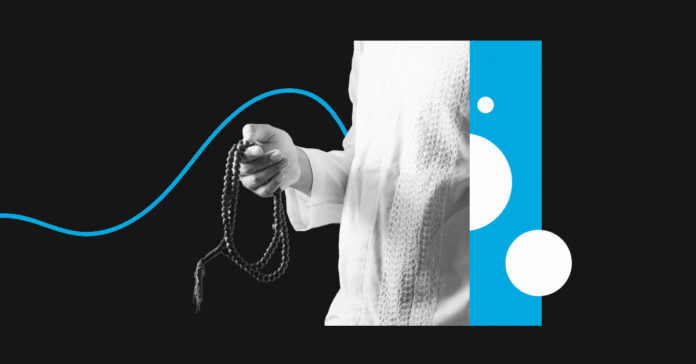I have noticed that it is a trial when a believer invokes Allah but his supplication (du’a) is not answered, even though he may repeat it for a long time! In such case, he should understand that this is a test that requires him to be patient, the whispers and suggestive thoughts that come to mind when the supplication of a person is delayed is a kind of sickness that requires treatment.
I myself have been exposed to this kind of test. Once, I had a calamity and so I invoked Allah [to remove this calamity] but my prayers (du’a) were not answered though I invoked Him excessively. This made the Shaytan start whispering to me, ‘If His generosity is without boundaries and miserliness is impossible, how come your supplication is not answered yet?’ I said to him, ‘O cursed one, be gone. I neither need you to advise me nor accept you as an advisor.’
Then I addressed myself, Beware of his whispers and suggestions If delaying the answer of your supplication was only to test you to fight your enemy [i.e. Shaytan] it would have sufficed as wisdom.’ The ‘self’ asked: ‘Console me so that I can handle the delay of the answering my supplication.’ I said:
First: It is evident that Allah, Most High, is the Owner (al-Malik) of everything and the Owner has the right to give and prevent, and so you have no right to object to His Decision.
Second: The wisdom of Allah is proven by unquestionable proofs, hence you may assume the benefit in a matter while, in fact, the wisdom of Allah states otherwise. This is similar to how the wisdom of what a doctor does is unknown to the patient as he may do things that give the impression they are harmful while such actions are intended to bring forth benefit. Thus, delaying the answer of your supplication can be just like this.
Third: ‘There might be a benefit to you when the answer of your supplication is delayed and may cause harm should the prayer have been answered immediately. The Prophet (ﷺ) said, “The slave [of Allah] will be fine so long he is not hasty and says, ‘I supplicated but my prayers were not answered.”[1]
Fourth: The answer to your supplication might be blocked due to a defect in you specifically your food could be from a doubtful source, or your heart was heedless at the time of invoking, or you are being punished for a sin you have not sincerely repented from.
That being said, you should investigate some of these reasons so you may understand why the answer was delayed.
It was reported that a non-Arab took over the house of Abu Yazid (radiy’Allahu ‘anhu). When he saw that, he entered the house and removed a new mud brick that he recently added to the house. Then, he asked his companions to remove the new mud bricks. Upon removing the block the man left the house. He was asked about what happened and so he said, ‘That block of mud was received from a doubtful source and as soon as the doubt was removed from the house, the harm was also gone.’
It was also reported that Ibrahim al-Khawwas once went to advise against a wrongdoing, but while he was on the way a dog started to bark at him and did not let him pass. So, he returned to the Masjid, prayed and then walked to advise against the wrongdoing again. When he reached where the dog was, the dog started to wag it’s tail and let him pass. When he reached his destination and advised against the wrongdoing. He was asked about what happened and he answered, ‘I had a sin, thus the dog stood in my way but when I returned to the Masjid I repented from that sin, and so it happened as you saw.’
Fifth: You should think of the outcome of receiving what you asked for because it is possible that if you had what you asked for, that would increase your sins or stop you from attaining a high rank; therefore not answering your supplication was for your own good.
It was reported that one of the righteous predecessors (salaf) used to constantly ask Allah to give him the opportunity to partake in battles until one day he heard a voice saying “If you participate in the battle you will be captured, and if you are captured you will apostate.”
Sixth: It is possible that not having what you ask for will keep you standing at the door of Allah asking Him and seeking His help, whereas having what you asked for will make you busy with it and also neglectful of the One you asked.
This is seemingly the case because if you had no need of something to ask for, you would have not invoked Allah seeking His help.
This is why when people become too busy with the blessings of Allah, Exalted is He; He tests them in these blessings pushing them to his gate begging for His help. For this reason, such trials and tests are actually blessings from Allah but have been concealed in the form of a trial.
This is because a true trial is when a person is being too busy in a worldly matter to remember His Lord whereas a trial that makes you stand before Him praying and invoking is what make you beautiful.
If you contemplate on all these things you will busy yourself with what will benefit you; you will rectify your affairs, repent from a sin, and stand at the door of the Lord of all lords.
[Captured Thoughts by Ibn Jawzi, p. 189-192]
Notes:
[1] Bukhari, #2740 and Muslim, #2735 on the authority of Abu Haurayrah (radiy’Allahu ‘anhu)









